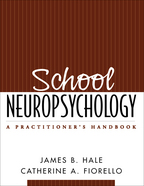School Neuropsychology
A Practitioner's Handbook
James B. Hale and Catherine A. Fiorello
A Paperback Originale-bookprint + e-book
A Paperback Original
orderMarch 24, 2004
ISBN 9781593850111
Price: $51.00 328 Pages
Size: 8½" x 11"
This book has been replaced by School Neuropsychology, Second Edition, by Margaret Semrud-Clikeman, Catherine A. Fiorello, and James B. Hale, ISBN 978-1-4625-5518-5.
“This book is the first of its kind and represents an initial step in the right direction for school psychology, especially in light of the new requirements of the Individuals with Disabilities Education Act....We praise the authors for writing this book, which definitely will be a positive addition to the school psychology and psychology in the schools" literature.”
—Applied Neuropsychology
.
Table of Contents
Introduction to School Neuropsychology1. Assessment and Intervention Practices in Educational Settings
2. A Model of Brain Functioning
3. Neuropsychological Approaches to Assessment Interpretation
4. Linking Assessment to Intervention
5. The Neuropsychology of Reading Disorders
6. The Neuropsychology of Mathematics Disorders
7. The Neuropsychology of Written Language Disorders
8. Neuropsychological Principles and Psychopathology
